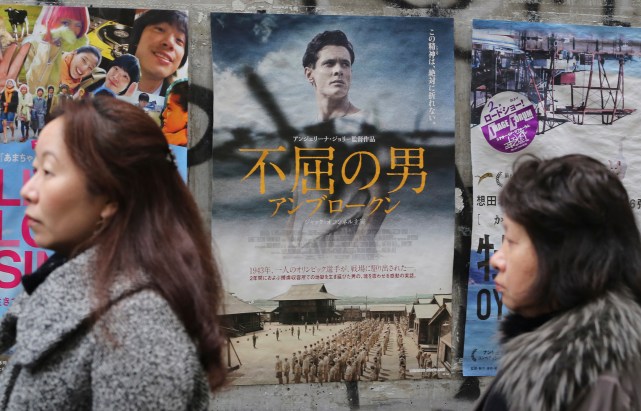People living in Japan are used to Hollywood films coming out months after their US release date. But it’s unusual for a movie to come out a year after its release.
Finally, on Saturday afternoon, I got to watch the film Unbroken.
 Directed by the actress, Angelina Jolie, Unbroken is the incredible story about Louis Zamperini, whose life defies belief. He was an Olympian in the 1936 Olympics, who finished eighth in the 5,000 meters final, but did so in such dramatic fashion that Adolph Hitler sought him out to shake his hand.
Directed by the actress, Angelina Jolie, Unbroken is the incredible story about Louis Zamperini, whose life defies belief. He was an Olympian in the 1936 Olympics, who finished eighth in the 5,000 meters final, but did so in such dramatic fashion that Adolph Hitler sought him out to shake his hand.
He was a bombardier on a B-24 fighting in the Pacific War, was a survivor not only of a crash on a rescue mission in the middle of the Pacific Ocean, but also 47 days on a life raft without food or water.
His life up to that point is a miracle, but when he was finally found and captured by Japanese troops on the Marshall Islands, he embarked on a more brutal path as a prisoner of war in various camps in Japan. The brutality he and other POWs endured is portrayed in the movie fairly graphically.

It was this depiction of the Japanese overlords, among other things, that was feared to provoke right-wing groups if the film were to be shown in Japan. But one year later, after countless appeals by Jolie to bring the film to Japan, Toho-Towa finally decided to distribute the film after a delay, and a small art-house theater in Shibuya called Theater Image Forum which seats only 64 people, decided to show the film.
According to the AP report, the “distributor said in a statement that it decided to go ahead with the showing because various views on war should be expressed, and because it was unnatural for a movie about Japan not to be shown in the country.”
Bravo.
Too bad that only 2 theaters in all of Tokyo are showing the film.
The film itself is a Hollywood biopic – in other words, a traditional telling of a great person’s life – a chronologically told tale of the person’s significant moments, with flash backs here and there. But because Zamperini’s life story is epic, it’s impossible not to be impressed.
Perhaps the most striking was not the performance of Jack O’Connell, who portrayed Zamperini in the film. It was of the Japanese singer turned actor, Miyavi, who was at times electrifying as a POW camp authority whose sadistic nature made life, as it were, intolerable for the prisoners.

Zamperini’s life after the war was a personal challenge – how does one digest the horrors he faced and emerge a fully functioning member of a peace-time society? And yet, he did, and came to realize that forgiveness was the only way out of his personal pit of lifelong trauma. As the movie, as well as this documentary by CBS on Zamperini depict, the man, unbroken, did return to Japan in 1998. He carried the Olympic torch for a kilometer at a ceremony leading up to the Nagano Winter Games. And the Torrance Torch, as he was once called as a high school track phenom, shone bright once again.
(Go to the 33 minute mark for that wonderful moment.)
You must be logged in to post a comment.